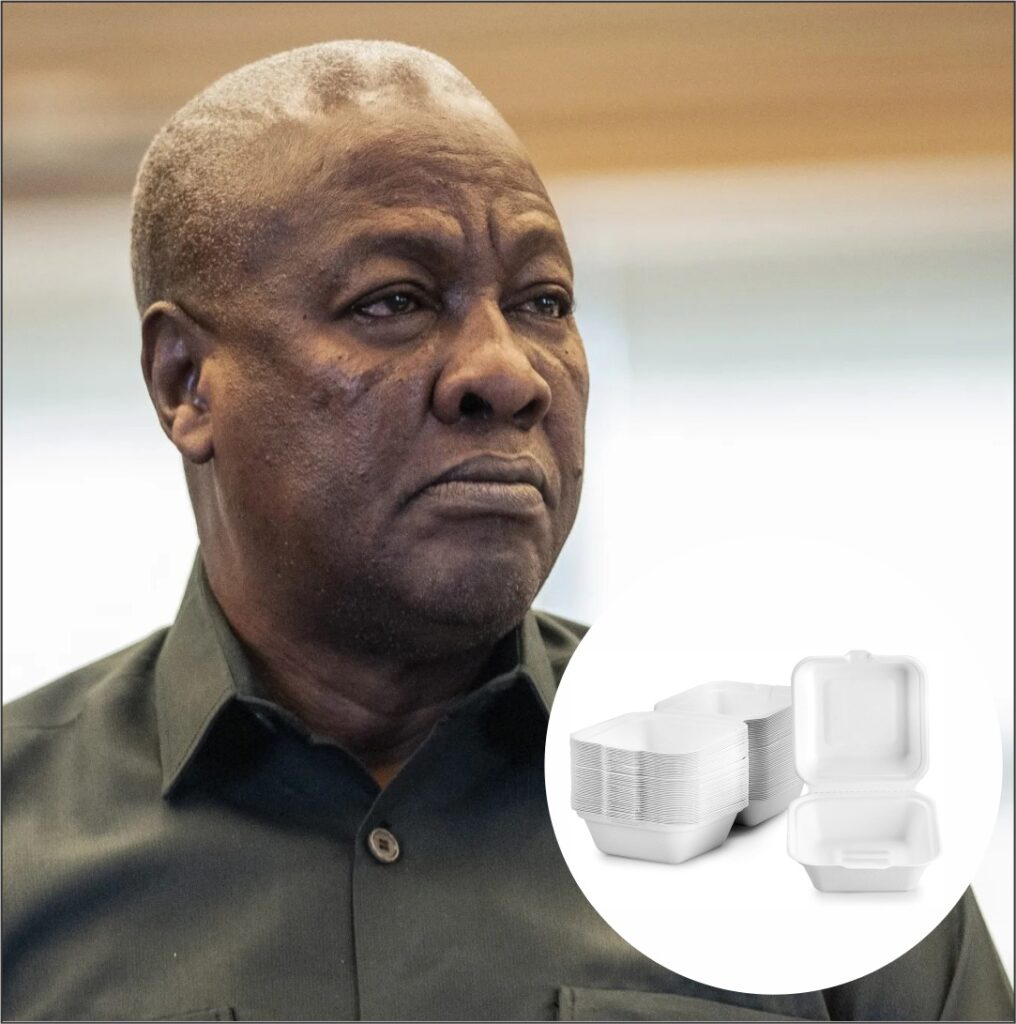President John Dramani Mahama has declared that the government of the National Democratic Congress (NDC) will soon place a ban on the production and import of styrofoam (takeaway packs) as food containers in Ghana to reduce plastic pollution.
This decision, he explained, is part of a larger initiative to combat plastic pollution and encourage the use of safer, more eco-friendly options.
During a national event for World Environment Day 2025 at the Kwabenya Community Day School on Thursday, June 5, 2025, President Mahama mentioned that the Ministry of Environment, Science and Technology would start implementing the ban in the upcoming months.
“We will ban the import and production of styrofoam in Ghana. Food packaging will transition to paper or aluminum foil,” Mr. Mahama stated.
“I’m notifying manufacturers and importers to get ready for this change, as the Ministry of Environment will soon put this policy into effect.”
The ban is anticipated to impact many food vendors, takeaway businesses, importers, and local producers, especially those who depend on styrofoam packaging because of its low cost.
President Mahama said Environmental specialists have frequently expressed concerns about styrofoam, labeling it as non-biodegradable and detrimental to drainage systems, coastal ecosystems, and human health.
Mr. Mahama pointed out that the extensive use of single-use plastics, including styrofoam, has led to increasing environmental issues throughout the nation.
“Plastics are blocking our gutters and waterways, littering our beaches, polluting our agricultural lands, and suffocating our urban streams,” he remarked.
He revealed that research has predicted that if the necessary measures are not taken to curb menace, plastics could outnumber fish in the ocean by 2050.
The President also highlighted several ongoing policy initiatives aimed at tackling these issues.
President Mahama said the National Plastics Management Policy requires manufacturers and importers to fully take responsibility for their products in the market adding that government has also updated its Solid Waste Management Strategy, aiming to cut plastic waste in landfills by 60% by 2030.
Mr. Mahama mentioned that some city authorities, like those in Tamale and Takoradi, are already testing waste separation programs for households and markets with color-coded bins. He noted that the results have been positive.
“Entrepreneurs are turning used plastics into building materials, textiles, and fuel briquettes,” he stated. “The dustbins shown today, made from recycled plastic, demonstrate this innovation.”
The move to eliminate styrofoam follows another government directive to stop using wooden furniture in public schools. Mr. Mahama indicated that desks will soon be made from recycled plastic or metal, as part of a broader effort to decrease deforestation.
The event also introduced the One Tree Per Child initiative, which aims to involve every school-aged child in planting and caring for a tree.
Mr. Mahama explained that each student will receive a seedling appropriate for their local area, with support from teachers, forestry officials, and community leaders.
He emphasized that the aim is not just to plant millions of trees by 2030, but also to foster a sense of care and responsibility for nature among the youth.
Mr. Mahama encouraged the public to back the initiative and take personal steps to enhance their environment.
“To every Ghanaian, I present a simple challenge: commit to not littering, reduce plastic use, and plant and nurture at least one tree,” he urged.
“Let us reject single-use plastics, sort our waste at home, choose sustainable options, and teach our children by example that a clean, green Ghana is both achievable and essential.”


